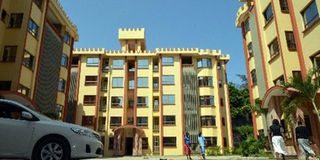Housing crisis will not improve soon

Experts warn of a serious housing shortage within the next five years. PHOTO | FILE| NATION MEDIA GROUP
What you need to know:
For instant, a 2015 report Knight Frank, a global property consultancy firm, for the year ending September 2015 indicates that the housing prices in the country have for this year alone, risen by over 3.5 per cent.
The report indicates that on a six-month basis, asking prices for houses in the country, and particular Nairobi, went up 1.1 per cent while a 0.2 per cent increase was recorded for the three months to September.
The country’s property market is touted as the third most developed in Sub- Saharan Africa behind Namibia and South Africa.
Poor financing, bureaucracy, corruption and lack of government support continues to delay the country’s quest to bridge the housing gap across the region.
Despite making great strides in improving the housing condition in the country, critics have argued that little has been done to accommodate the surging population at the capital in Nairobi and across the region.
Already, market observers have warned of an acute shortage of housing to cater to the growing middle class within the next few years.
Property consultancy company HassConsult, in an annual report released last year on the country’s property trends said that while the middle upper and above huosing markets are facing a housing glut, the lower middle class is finding it difficult to locate suitable housing, either for purchase or to rent.
“Matters have further been complicated by a sharp increases in land rates and county government construction fees which have in the process increased financial disincentives to housing development,” says the first-ever annual report on the state of development launched in partnership with the Kenya Property Developers Association.
Consequently, counties of Kisumu, Nakuru, Mombasa among others have also expressed concerns over lack of housing.
Also, while a majority of housing developments have focused on the upper middle-class, little focus has been made on the lower tier of middle income earners.
Property developers who spoke to DN2 opined that even though numerous efforts were being put in place to meet the growing demand, constant frustrations from both government departments and regulators was stifling the process.
Ms Elizabeth Mwangi—Oluoch, chief executive officer of the Kenya Property developers Association said that unless the challenges facing developers are addressed, provision of affordable housing may not be achieved soon.
“The demand still continues to surpass supply and with greater public and private sector engagement, innovative ways can be generated to reduce the cost of housing and help meet the growing demand for housing in Kenya,” she said.
Ms Mwangi said that corruption both in the private and public sectors have made basic procedures in a developer putting up affordable housing much more expensive. This cost is then borne by home buyers. The result, she argues, haa rise in house prices, a situation that has prevented a majority of Kenyans from purchasing or renting.
For instant, a 2015 report Knight Frank, a global property consultancy firm, for the year ending September 2015 indicates that the housing prices in the country have for this year alone, risen by over 3.5 per cent.
The report indicates that on a six-month basis, asking prices for houses in the country, and particular Nairobi, went up 1.1 per cent while a 0.2 per cent increase was recorded for the three months to September.
The country’s property market is touted as the third most developed in Sub- Saharan Africa behind Namibia and South Africa.
“An example of this is evident in the general paying of various levies, permits and licenses required when one is putting up a development. When a developer is seeking for permits from various regulatory bodies, they are forced to pay bribes to “facilitate” the rapid conclusion of getting their licenses or permits approved,” said Ms Mwangi.
Besides corruption, property developers, Ms Mwangi says, have also had to content with poor or lack of better financing both from banks and other lenders.
This is partly because besides stringent rules and interest rates charged on bank loans, developers also suffer slow payments of loans, a situation that she says leads to one having to pay triple the amount their borrowed from the institutions.
Similarly, inefficient land processes have also been attributed to the slow development of housing projects in the country. This is because, according to developers, basic processes like registration of property has since cumbersome, lengthy and expensive.
This is besides the manual of the titling process which leaves a lot of room for mischief, according to Ms Mwangi.
“Currently, the issuance of title deeds, sub title registration is lengthy with many developers being informed that their title deeds cannot be traced at the Ministry. This is code for ‘I want a bribe’.
“Also making developments take longer to finish which eventually increases the cost of construction and thus reducing a developer’s ability to lower the cost of housing,” she said.
Finally, according to the developers, the country’s property industry has also suffered a lack of adequate government support in form of incentives payable to developers who carry out affordable housing projects and an absence of tax relief for affordable housing project developers.
The property sector also faces the criticism of lack of concurrence in development of infrastructure vis-à-vis housing development in the regions.





